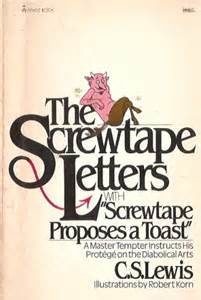 “We must picture Hell as a state where everyone is perpetually concerned about his own dignity and advancement,”” advised C. S. Lewis, “where everyone has a grievance, and where everyone lives the deadly serious passions of envy, self-importance, and resentment.”
“We must picture Hell as a state where everyone is perpetually concerned about his own dignity and advancement,”” advised C. S. Lewis, “where everyone has a grievance, and where everyone lives the deadly serious passions of envy, self-importance, and resentment.”
Lewis wrote those words in his preface to the 1961 edition of The Screwtape Letters. Although Screwtape is, in one sense, a comical devil, Lewis never lets his readers forget what lies at the heart of hell: the self, with all its outcroppings of jealousy, bitterness, and backstabbing.
Yet his picture of hell is not what most would imagine. Instead, he compares it to modern bureaucracy. “I like bats much better than bureaucrats,” he mused. And you can bet he didn’t have any real fondness for bats.
 Interestingly, I first ran across Lewis’s description of hell as a bureaucracy not in this preface (somehow its existence escaped me until recently), but in Ronald Reagan’s famous 1983 speech to the National Association of Evangelicals, the speech dubbed by some “The Evil Empire.”
Interestingly, I first ran across Lewis’s description of hell as a bureaucracy not in this preface (somehow its existence escaped me until recently), but in Ronald Reagan’s famous 1983 speech to the National Association of Evangelicals, the speech dubbed by some “The Evil Empire.”
Reagan quoted Lewis in the speech and referenced Screwtape in doing so. Yet I was puzzled at the time by the quote because I didn’t recall ever reading it in the actual letters. I was delighted, therefore, to come across it in this preface.
“I live in the Managerial Age, in a world of ‘Admin.'” To Lewis, that was as close to hell as possible. He then expounded on that opening thought:
The greatest evil is not now done in those sordid “dens of crime” that Dickens loved to paint. It is not done even in concentration camps and labour camps. In those we see its final result.
But it is conceived and ordered (moved, seconded, carried, and minuted) in clean, carpeted, warmed, and well-lighted offices, by quiet men with white collars and cut fingernails and smooth-shaven cheeks who do not need to raise their voice.
Hence, naturally enough, my symbol for Hell is something like the bureaucracy of a police state or the offices of a thoroughly nasty business concern.
 Hell, Lewis opined, is a “society held together entirely by fear and greed.” The “whole organisation” operated on the principle of “dog eat dog.”
Hell, Lewis opined, is a “society held together entirely by fear and greed.” The “whole organisation” operated on the principle of “dog eat dog.”
Everyone wishes everyone else’s discrediting, demotion, and ruin; everyone is an expert in the confidential stab in the back. Over all this their good manners, their expressions of grave respect, their “tributes” to one another’s invaluable services form a thin crust.
Every now and then it gets punctured, and the scalding lava of their hatred spurts out.
Lewis, of course, is doing more than merely painting his portrait of how hell functions; he’s sending out a warning to us who live in a world that often resembles hell.
How do we function? Are we, behind our impeccable manners and outward show of civility, undermining our associates secretly? Do we operate on the principle of “dog eat dog”? Does our thin crust of respect for others occasionally reveal itself as a “scalding lava of hatred”?
As always, Lewis wants us to examine ourselves, to look into our own hearts and, if we see anything there that has even the remotest connection with hell, to expunge it immediately.
We must live in a continual state of self-examination (not obsessive, but realistic) and an eagerness to repent of anything we see amiss. We want the fragrance of Christ to show in our lives, not the sulfurous odor of hell.
Therefore, if anyone is in Christ, the new creation has come: The old has gone, the new is here! 2 Corinthians 5:17
